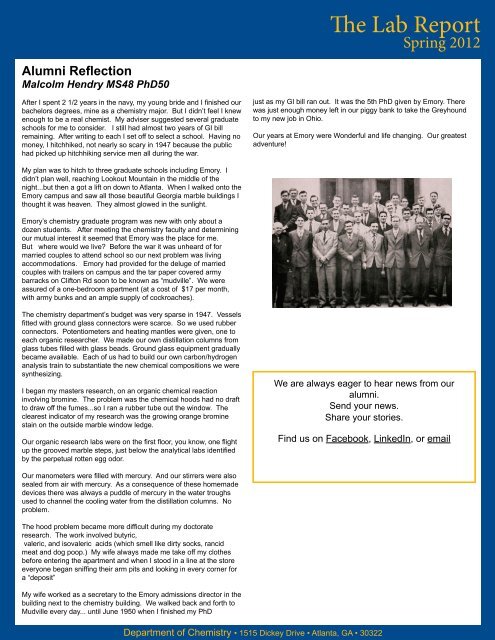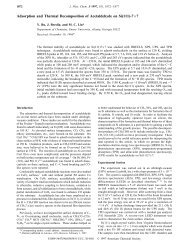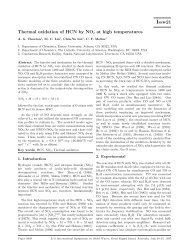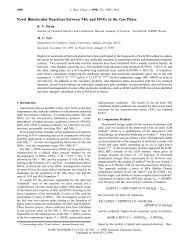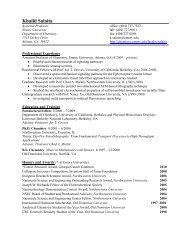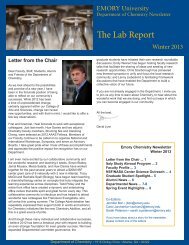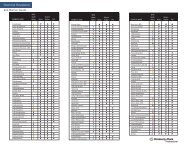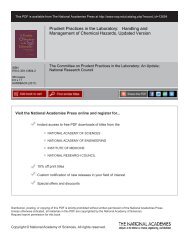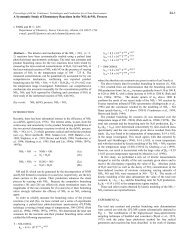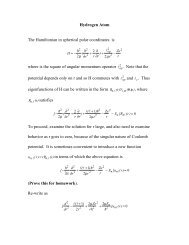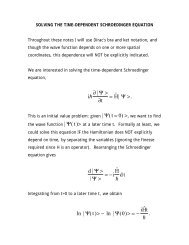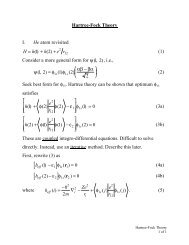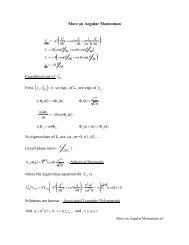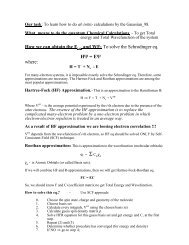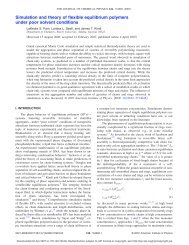The Lab Report Spring 2012 - Chemistry - Emory University
The Lab Report Spring 2012 - Chemistry - Emory University
The Lab Report Spring 2012 - Chemistry - Emory University
Create successful ePaper yourself
Turn your PDF publications into a flip-book with our unique Google optimized e-Paper software.
<strong>The</strong> <strong>Lab</strong> <strong>Report</strong><br />
<strong>Spring</strong> <strong>2012</strong><br />
Alumni Reflection<br />
Malcolm Hendry MS48 PhD50<br />
After I spent 2 1/2 years in the navy, my young bride and I finished our<br />
bachelors degrees, mine as a chemistry major. But I didn’t feel I knew<br />
enough to be a real chemist. My adviser suggested several graduate<br />
schools for me to consider. I still had almost two years of GI bill<br />
remaining. After writing to each I set off to select a school. Having no<br />
money, I hitchhiked, not nearly so scary in 1947 because the public<br />
had picked up hitchhiking service men all during the war.<br />
just as my GI bill ran out. It was the 5th PhD given by <strong>Emory</strong>. <strong>The</strong>re<br />
was just enough money left in our piggy bank to take the Greyhound<br />
to my new job in Ohio.<br />
Our years at <strong>Emory</strong> were Wonderful and life changing. Our greatest<br />
adventure!<br />
My plan was to hitch to three graduate schools including <strong>Emory</strong>. I<br />
didn’t plan well, reaching Lookout Mountain in the middle of the<br />
night...but then a got a lift on down to Atlanta. When I walked onto the<br />
<strong>Emory</strong> campus and saw all those beautiful Georgia marble buildings I<br />
thought it was heaven. <strong>The</strong>y almost glowed in the sunlight.<br />
<strong>Emory</strong>’s chemistry graduate program was new with only about a<br />
dozen students. After meeting the chemistry faculty and determining<br />
our mutual interest it seemed that <strong>Emory</strong> was the place for me.<br />
But where would we live Before the war it was unheard of for<br />
married couples to attend school so our next problem was living<br />
accommodations. <strong>Emory</strong> had provided for the deluge of married<br />
couples with trailers on campus and the tar paper covered army<br />
barracks on Clifton Rd soon to be known as “mudville”. We were<br />
assured of a one-bedroom apartment (at a cost of $17 per month,<br />
with army bunks and an ample supply of cockroaches).<br />
<strong>The</strong> chemistry department’s budget was very sparse in 1947. Vessels<br />
fitted with ground glass connectors were scarce. So we used rubber<br />
connectors. Potentiometers and heating mantles were given, one to<br />
each organic researcher. We made our own distillation columns from<br />
glass tubes filled with glass beads. Ground glass equipment gradually<br />
became available. Each of us had to build our own carbon/hydrogen<br />
analysis train to substantiate the new chemical compositions we were<br />
synthesizing.<br />
I began my masters research, on an organic chemical reaction<br />
involving bromine. <strong>The</strong> problem was the chemical hoods had no draft<br />
to draw off the fumes...so I ran a rubber tube out the window. <strong>The</strong><br />
clearest indicator of my research was the growing orange bromine<br />
stain on the outside marble window ledge.<br />
Our organic research labs were on the first floor, you know, one flight<br />
up the grooved marble steps, just below the analytical labs identified<br />
by the perpetual rotten egg odor.<br />
We are always eager to hear news from our<br />
alumni.<br />
Send your news.<br />
Share your stories.<br />
Find us on Facebook, LinkedIn, or email<br />
Our manometers were filled with mercury. And our stirrers were also<br />
sealed from air with mercury. As a consequence of these homemade<br />
devices there was always a puddle of mercury in the water troughs<br />
used to channel the cooling water from the distillation columns. No<br />
problem.<br />
<strong>The</strong> hood problem became more difficult during my doctorate<br />
research. <strong>The</strong> work involved butyric,<br />
valeric, and isovaleric acids (which smell like dirty socks, rancid<br />
meat and dog poop.) My wife always made me take off my clothes<br />
before entering the apartment and when I stood in a line at the store<br />
everyone began sniffing their arm pits and looking in every corner for<br />
a “deposit”<br />
My wife worked as a secretary to the <strong>Emory</strong> admissions director in the<br />
building next to the chemistry building. We walked back and forth to<br />
Mudville every day... until June 1950 when I finished my PhD<br />
Department of <strong>Chemistry</strong> • 1515 Dickey Drive • Atlanta, GA • 30322


